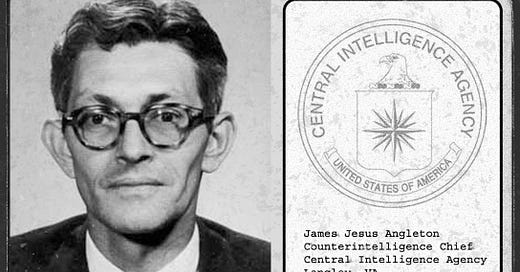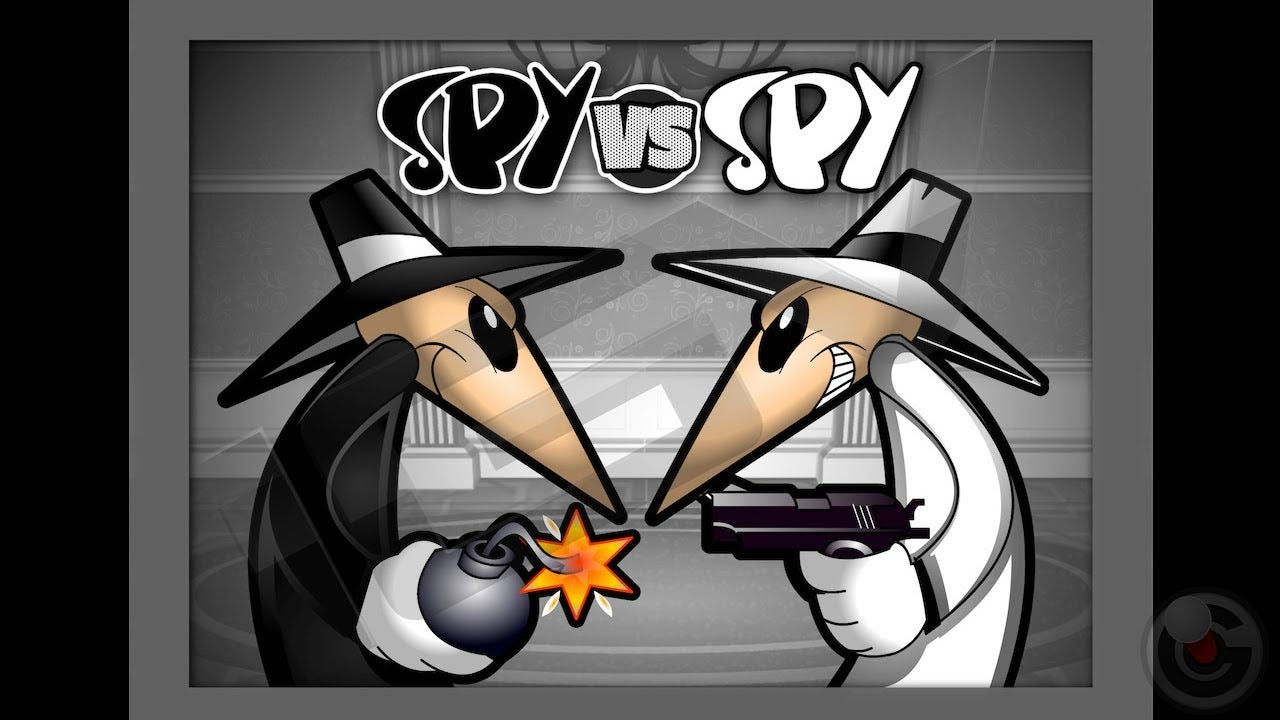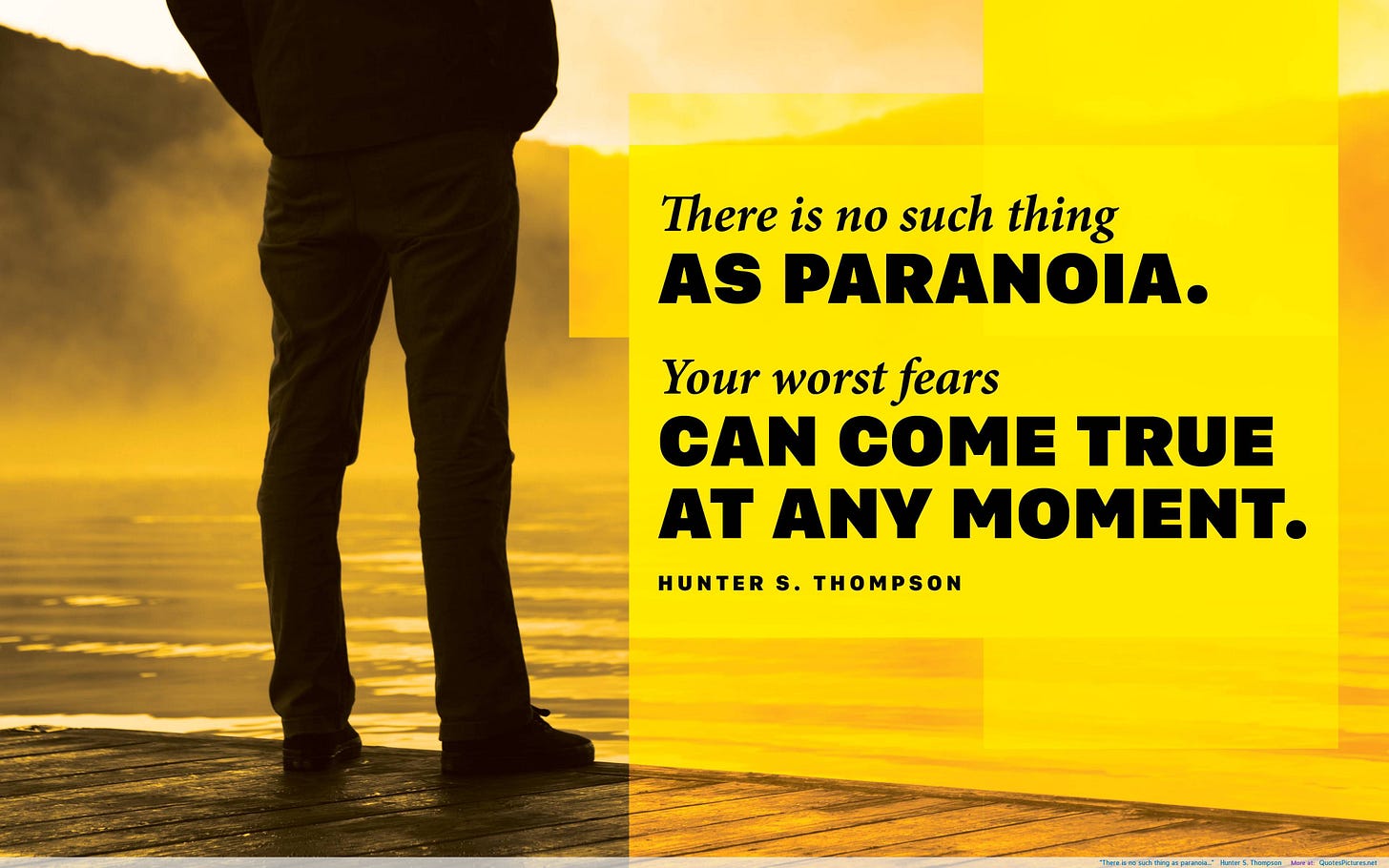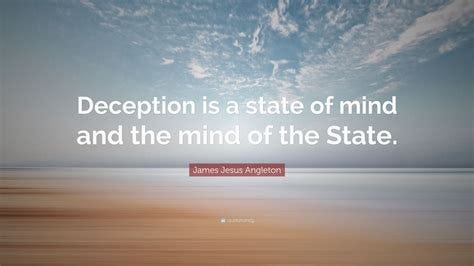The Prophet of the Chilled Delirium
Inside James Jesus Angleton's Wilderness of Smoke n' Mirrors
👀 ‘…These with a thousand small deliberations/Protract the profit of their chilled delirium/…Excite the membrane, when the sense has cooled/With pungent sauces, multiply variety/In a wilderness of mirrors….’ — T.S. Eliot, “Gerontion”.
👀 ‘If I were ever asked to single out one specific group of men, one type, one category, as being the most suspicious, unbelieving, unreasonable, petty, inhuman, sadistic, double-crossing set of bastards in any language, I without say without any hesitation—the people who run counter espionage departments.— Spy author Eric Ambler, Light of Day.
AUTHOR NOTE: In paraphrasing TS Eliot's Gerontion, as Capitalism's Invisible Army (aka “The Company”), we might argue [that] any success the Central Intelligence Agency has enjoyed 'protract[ing] the profit of their chilled delirium' for their ultimate overlords might best be evaluated via the prism of the cost they've exacted from the rest of humanity in the process. The JFK assassination is perhaps Exhibit A here. The following ‘evaluation’ hopefully adds something to that understanding. At least it might do for those who just ‘came in from the cold’, and may be wondering what all the fuss is about.
— The Ghost-Spy (In a Mansion of Many Rooms)
As an avid student of politics and history, I’ve long harboured an abiding—bordering on prurient—fascination with what I call the World’s Second Oldest Profession. We’re talking espionage here; you know, the “Spy v Spy” Thing. Within that rarefied milieu can be found some of humanity’s most intriguing, complex oddballs, its most flawed, flaky yet still compelling personalities, along with its most unreconstructed reprobates, renegades, rogues, and furtive fabulists. To say nothing of its most depraved, ruthless, amoral, treacherous, sadistic, perverted bottom feeding misanthropes.
For his part, the great espionage novelist John le Carre perhaps said it best. A former spook himself, he was less than magnanimous in his summation of the profession of which he was once a part and that later provided him his meal ticket as a writer:
‘What do you think spies are: priests, saints and martyrs?…They are a squalid profession of vain fools, traitors too yes; pansies, sadists, and drunkards, people who play Cowboys and Indians to brighten their rotten lives’.
Given the nature of the trade, all this is perhaps to be expected. Either way, we’re mos’ def’ not talking 007 here.
James Jesus Angleton, for twenty years until 1973 the Central Intelligence Agency’s (CIA) legendary (or notorious, depending on one’s perspective on these matters) counterintelligence spymaster, is for my shekel, one such exemplar.
To borrow from TS Eliot—along with Ezra Pound, one of JJ’s favourite poets*—Angleton was the ‘prophet of the chilled delirium’, a stalwart protector of the then nascent post-World War Two U.S. imperium whose values (truth, justice, liberty, democracy, freedom and the unbridled pursuit of happiness), he was dedicated to uphold and sworn to defend. (*Full disclosure: As he was for your humble BTW!)
Back in his heyday though, per the standard requirements of his profession he could be reliably counted on to neither confirm nor deny the significance of the sub-rosa role he played in some of the most game changing events, incidents, developments and clandestine operations during the Cold War, with the JFK Thing being as we’ll see perhaps the most singular of these. This, in either the assassination conspiracy itself (yes pilgrims, there was a real deal conspiracy, indeed one of history’s biggest, most complex, and most consequential; I truly hate to break it to you all), and/or its subsequent cover-up.
For instance, seeking a clearer understanding of the precise nature of Angleton’s connection to and/or relationship with modern history’s most famous murder suspect—one Lee Harvey Oswald—prior to November 22, 1963, might best be obtained by asking the following: What did the Uber-spook know about LHO and when did he know it? In fact we can just as easily ask: What did JJ know about anything at all to do with the Kennedy assassination and when did he know it all?
Put another way, if we accept that the CIA did indeed play a significant role in the murder of Number 35 and/or its coverup—a proposition that few serious JFK gumshoes would dispute with a straight face—it’s a dead cert JJ had a hand in either the conspiracy or the coverup, or (more likely) both. (See link here.)
For readers wishing then to become better acquainted with the man and his life and times, The Ghost: The Secret Life of CIA Spymaster James Jesus Angleton, Jefferson Morley’s recent bio, is as good an entree into the enigmatic JJ’s “Wilderness of Mirrors”. Whilst not suggesting that Morley’s book delivers the definitive angle (sorry😙) on the man, his book is nonetheless recommended, certainly for newbies to the JFK labyrinth.
Indeed, it was a full reading of Morley’s book that prompted me to revisit JJ’s tenure and his legacy. Recently recovered from your humble’s memory-holed archives (edited slightly and updated for context, contemporary resonance, and clarity), ten years ago I penned the following—partly whimsical, partly serious, sometimes tongue-in-cheek, yet hitherto unpublished—observations about Angleton. This was at the time I first began writing about US history and politics.
As already noted, there is little doubt that this bloke knew far, far more about the JFK Thing than he ever let on, a revelation that becomes even more ‘crystal’ upon reading Morley’s tome. This, along with many, many other deep dark secrets about CIA skulduggery and huggermuggery (and it has to be said, frequently buggery), he took to his final resting place (presumably that ‘safe-house’ in the spy-sky). More’s the pity I say. Without further ado, here’s the ‘skinny’ on the man of whom it might be said—at least insofar as the US was concerned—put the “v” in “Spy v Spy”, or was the “Cloak” in the “Cloak and Dagger” in modern espionage tradecraft.
— The Cloak and The Dagger
Before continuing, some mention should be made about the fine dark art of counter-intelligence (or counter-espionage), the spy-craft specialty which was in JJ’s wheelhouse. This, if only because it reinforces the fact that the CIA didn’t always get it right here either, though this reality was perhaps less obvious that its more infamous missteps and cock-ups. (See here. And see this link to Joseph Trento’s Secret History of the CIA.)
It also points to the CIA’s relationship with Great Britain’s premier spying service [MI6], and it’s involvement in, and connection to, some of the UK’s own most notorious spy scandals and the men who attached their name to these scandals. Here the standout was the infamous (Kim) Philby, (Guy) Burgess, (Donald) McLean spy ring/conspiracy that operated in British intelligence at the highest levels throughout the 50’s and 60’s.
The improbably named James Jesus Angleton, as the CIA’s chief of counter-intelligence, was the CIA’s brain for years. Nick-named “The Kingfisher”, he began his CIA career shortly after its formation in 1947, and was amongst the most out-there of people. Angleton (aka “Mother”) was a TS Eliot quoting, chain-smoking, orchid-growing, fly-fishing, gem collecting, martini-quaffing, liquid-lunching, paranoid, insomniac raconteur who burned the spook-candle at both ends, and then some. That he ended his career ignominiously and as burnt-out wreck of his former self was perhaps as much of a fitting demise as it wasn’t a surprise for those with whom he was intimately acquainted. This will become more evident as our story proceeds.
Exceedingly well-read and (counter?) intelligent, Angleton was something of a polymath. This dude was considered the sharpest tool in the spy shed, bar none too many others! JJ’s motto: 'absolute security at any cost', one that avec large dollops of irony would prove his undoing. The term ‘Angeltonian’ even inserted itself into tradecraft spy-speak to become a byword for overtly conspiratorial conduct and/or obsessively paranoid behaviour. It wasn’t always intended as a compliment. He was once also quoted as saying: 'Deception is a state of mind and the mind of the state'.
INTERLUDE: Angleton, Mossad, and the Kennedy Assassinations
Article by Laurent Guyenot, June 5, 2022, the Unz Review..
“…perhaps no one epitomized the twisted mind games played by intelligence agencies more than James Jesus Angleton, the notorious CIA Counterintelligence Chief for so many years, in whose safe were found gruesome photos of Robert Kennedy’s autopsy. Why, one may ask, were those photos there, since Angleton allegedly had no connection to the RFK killing and since Sirhan Sirhan was said to be the assassin? Was Angleton’s work as CIA liaison with Israel in any way connected?” — “The Blatant Conspiracy Behind Robert F Kennedy’s Assassination”, Edward Curtin, CounterCurrents, May, 2018.
Angleton was like then DCI Allen Dulles’s alter-ego—he was the uber-counter-spy, the spookiest of spooks in the spookier end of the profession (as noted, it being certainly at least the second oldest, if not arguably the oldest). If his boss Dulles (famously fired by president Kennedy in the wake of the disastrous “Bay of Pigs” Thing) was the Dagger in the modern “Cloak and Dagger” business, JJ was as noted the “Cloak”! His spycraft as noted was apparently second to none, certainly in the non-communist world. It was said though even the KGB had a bit of a fan club going; he was that good at what he did. They reportedly saw fit to copy some of his methods, proving that even in the spy world, the ‘imitation as the sincerest form of flattery’ thing still applies even with one’s enemies.
The origin of his nick-name “The Kingfisher” is uncertain. What we can say is that they are a bird species which have evolved unique visual faculties: they can see equally well in polar opposite environments, in their case air and water. A nice metaphor one imagines given his line of work, especially if it was unintended.
Equally interesting is that the kingfisher is also the bird that the mythical avian creature halcyon is based on, whose name is now synonymous with a peaceful era in time, as in ‘halcyon days’. Given his occupation and the part he played in the Grand American Narrative especially during the 'halcyon days' of the Cold War, there may be some interesting paths to explore in this respect. (In any event, much irony would abound to be sure in so doing. But like JJ often did, I digress.) On a more mundane level his nick-name may have been because of his striking features, which were in some measure bird-like, if not ‘kingfisherish’.
Regardless, JJ eventually rose to his position at the Company as much by the force of his intellect, as his cunning and his derring-do. And his ‘end justifies the means’ MO. Although it’s not known if he ever sought the position or was even offered it, he would’ve been a prime candidate for Director (DCI) either way in the wake of Dulles’s departure. He could even have interrogated/interviewed himself for the job, a bonus. The motherf**ker was that good.
— Spy v Spy (Rinse n’ Repeat)
As noted JJ served under Dulles, and then later on under Dulles’s successor, John McCone, then Dick Helms, and for a brief time William Colby. A cryptographer by training (and it has to be said) inclination, he was also very knowledgeable about nuclear technology, having worked on the Manhattan Project. He was apparently involved in the breaking of the Germans’ Enigma code, which did so much to aid the allied effort in the latter part of the War.
At is turned out, both these skills would come in handy during a Cold War. He was nothing if not cryptic, or (pun intended, enigmatic). When asked by the great gumshoe journo Seymour Hersh who was responsible for the assassination of JFK, he replied cryptically: “A mansion has many rooms…I’m not privy to who struck John.” If the estimable Sy Hersh was unable get a straight answer from the man, then that’s saying a lot, certainly much more than was to gleaned from JJ's response.
If there is such a thing as spy heaven then (a ‘safe house’ in the afterlife maybe?), most of its denizens be coming up to the Kingfisher, high-fiving his avian-eyed ass and saying how much they ‘loved his work’. As indicated he was as paranoid as they come, for the most part a truly valuable character trait in the counter-spy business, given that said business is all about stopping the targets of your spying from doing what you’re trying to do to them, which is to spy on them. By definition, this means being permanently suspicious, furtive and paranoid.
Or more accurately, the counter espionage/intelligence shtick is more about ensuring that the spies on the other side enjoy minimal success at recruiting your own spies to spy on you and not them as you’d prefer them to continue doing without you finding out about it until it is too late. (Ed. Note: I did say this was going to be a tad whimsical didn’t I?) Of course by any logical process this leads us into the world of counter-counter espionage, but let’s not go there; you get the picture. That’ll do your head in! And mine.
And if Angleton truly trusted anyone (besides his erstwhile mentor Kim Philby of course; see later), it is not known whether it worked to their advantage or not, and we’re not even talking about the Soviets here. We’re talking his own—indeed especially his own—CIA colleagues. He was one of the coldest and most calculating of Langley’s Cold Warriors. A strong pro-war hawk on Vietnam, like his mucker mate J Edgar Hoover, he was also notoriously known for his covert surveillance of anti-war protesters, political activists, freedom marchers and domestic dissidents (of which there were no shortages) during the Vietnam War era and throughout the 60’s and early 70’s.
He has also been frequently mentioned as having involvement in, knowledge of, and/or connections to the JFK hit (as mentioned), and the Norma Jean (aka Marilyn Monroe) suicide/accidental death/murder. Then there is also the mysterious (read: highly suspicious) murder in 1964 of Mary Pinchot Meyer, the beautiful and somewhat enigmatic mistress of JFK. In all of the above he shares a lot with Edgar, although they famously fell out later on. (Unlike “Edna”, it’s safe to assume that JJ did not share the Numero Uno G-Man’s predisposition for a good ‘frock up’ on his day off avec the requisite ‘lippie’, high heels and perhaps a fresh ‘Brazilian’ to complete the ensemble cum makeover). 😱😉😙
SIDEBAR: Who was Kim Philby, I hear you ask? He was the decidedly notorious MI6 (SIS) agent who for almost 30 years was a Soviet mole/double agent, perhaps the most damaging (read: successful) Cold War spy of all. He fooled a lot of people on both sides of the pond—including Angleton—for a very, very long time. So badly did this betrayal affect JJ, thereafter he became somewhat unhinged, seeing Soviet moles and double agents in every nook and cranny in and between both the realm and the republic.
Those closest to Philby—like his fellow MI6 officer and best friend since childhood, Nicholas Elliot (played with finesse and measured intensity by Damian Lewis), and Angleton—knew him as a loyal confidant and an unwavering patriot. He was a brilliant and charming man who rose to head Britain’s counterintelligence against the Soviet Union. Together with Elliott and Angleton, he stood on the front lines of the Cold War, ostensibly keeping the Communists at bay.
But Philby was secretly betraying them both: He was working for the Russians the entire time. Every word uttered in confidence to Philby by his colleagues in the West made its way to Moscow, leading countless missions to their doom and subverting American and British attempts to counter the Soviet threat.
So how was this cunning double-agent finally exposed? A recently released TV series “A Spy Among Friends” chronicles this story exceptionally well. It stars under appreciated Aussie actor Guy Pearce playing the role of Philby. The series was adapted from author Ben McIntyre’s book A Spy Among Friends: Kim Philby and the Great Betrayal. The book is based on personal papers and never-before-seen British intelligence files. Macintyre’s epic tale is one of the greatest spy stories ever, arguably the West’s worst intelligence disaster.
In the book, Macintyre (filling a role as executive producer on the series) weaves a compelling tale of how Philby got away with it for so long, and how he was eventually outed. I heartily recommend readers check this series out. It's an epic story of treachery, skulduggery, treason, intrigue, deception, betrayal, love (natch), friendship and loyalty, of the political and personal kind. All of it perhaps unrivalled in the annals of espionage. (It's on Apple TV here Down Under. Check your local streaming services.)
🤚⚠️👉 An important caveat here is essential: As good as I think this series is, none of the above is to suggest that Macintyre’s rendition of the “Cambridge Five” spy ring is the full Monty (ie. definitive) account. For a deeper-dive insight into the conspiracy and its links to the planet’s most powerful, longest serving, Uber-wealthy and ruthless cabal the Rothschilds—one that ventures far beyond what’s been revealed about it in this series and who were the principal players involved—see author and investigative journalist Joachim Hagopian’s treatment of the topic here in this link. Suffice to say, a more definitive account of this shabby affair is unlikely to see the light of day as ‘popular entertainment’. And not just because it would require a Herculean effort upon the part of audiences to suspend their disbelief!
— The Hollow Man (In a Mansion of Many Rooms)
As good as Angleton was, he wasn’t good enough though to pick up on arguably the biggest spies in the West before they defected to the Soviets. The “Cambridge Five” as they were known, were located in the UK, operating out of the august Cambridge University campus. As CI chief, part of his gig was liaison with foreign intelligence and security officials and assorted spooks, including with Mossad (not unlike a franchise, he ran Langley’s Israel desk exclusively), Iran’s SAVAK and Britain’s MI6.
Although some say he had his suspicions about the “Cambridge Five” enclave before anyone else did (including the British; yes, he was that paranoid even back then), he failed to identify who they were much less act on these suspicions in time to prevent their subsequent defection. This must count as one of the greatest ironies in the history of modern espionage. This was an outcome from which by most accounts he never recovered; indirectly it brought about his downfall eventually, but not for some time to come.
It may have also contributed to him becoming somewhat unhinged in later years. One of Angleton’s most “magnificent obsessions” was his infamous “mole-hunts”—unveiled in depth by Morley—which in so many respects came to define his career. Little did he know just how close the “moles” were.
After the belated discovery of the Cambridge spies (JJ had worked closely with Philby in London during the war and was his closest friend), Angleton became even more paranoid, seeing spies all over the Langley campus and beyond. This began to irritate a lot of people, managing to piss off not only many of his spook colleagues, but one J Edgar aka “Edna” Hoover (of whom more in a future dispatch) over at the FBI as well, with Hoover pulling the pin on any further cooperation with the super-spook.
To piss Edgar off of course was not all that challenging an exercise, and at the FBI at least, certainly not always a good career move. As for being paranoid, to be sure there were few more so than Edgar. But the similarly inclined Angleton surpassed even he. History tells us that sometimes paranoia is often proven most justified when it is the most ignored. Many though would argue the lessons of history don’t appear to have become part of collective political wisdom in the West, and especially some might say in Washington D.C.
Not even Angleton though could last forever in the CIA. His increasingly pathological paranoia eventually brought him unstuck. By the time William Colby took over as DCI after Richard Nixon fired Helms at the height of the Watergate Scandal, he’d even begun accusing foreign leaders (e.g. Britain’s Harold Wilson) and some of their close friends of espionage; suffice to say, few were beyond suspicion. He even had old Hank (“The Hunk”) Kissinger in the cross-hairs, and Hank was the god-dammed US Secretary of State fer chrissakes. Colby—never an ‘Angletonian’—eventually forced JJ in 1973 to hang up his trench-coat and trilby. Perhaps it might be said that the Great Spy had by this time worn out the soles of his winkle-pickers. This, to say little of his own soul, if indeed he possessed one.
Angleton’s paranoid imaginings may have cost him his job—not to mention the careers of many others who he accused of spying—but he may not have been so paranoid after all. Spies were eventually uncovered in the CIA of course (and elsewhere), with the notorious Aldrich Ames being a notable example, though that sad and sorry episode revealed itself much later.
Moreover, given JJ’s unstinting devotion to Israel (more soon), one wonders what he would’ve made of Jonathan Pollard. Though he wasn’t a CIA man, Pollard was as equally infamous as Ames. In 1987, despite an almighty hue n’ cry from the Tribe, the latter was sentenced to 30 years in the Big House for spying on behalf of Israel (incidentally, the same year that Angleton died.)
As for the betrayal by his friend Philby, JJ would’ve been less than human if he hadn’t been extremely pissed off after being duped by the Cambridge spies (one of whom included, much to his utter dismay, his former mentor and drinking buddy Philby). This was to be sure one of the most infamous and embarrassing security breaches in Cold War history.
Notably, although a goyim, he was an unreconstructed Judeophile. As earlier mentioned JJ was very, very tight with our Hebrew brethren, visiting Israel on countless occasions, and schmoozing with The Promised Land’s finest in government, intelligence, security, and military circles. A goyim he may have been, but in more ways than one JJ was the quintessential crypto-Zionist. It’s hardly then a stretch to suggest that the source of a great deal of Israel’s not inconsiderable influence and clout Stateside to this day can be traced back to this relationship, something of a political mutual admiration society. Few American non-Jewish officials have enjoyed so much the unstinting favour and affection of the Tribe.
SIDEBAR: Given his expertise in nuclear technology—not to mention his high level global connections and security credentials—was it possible Angleton assisted the Jewish state in some way, shape or form in its relentless and ultimately successful drive to develop its nuclear weapons program? There seems little doubt about this. In their 1989 book Widows: The Explosive Truth behind 25 Years of American Intelligence Disasters—in which narrative Angleton plays a central role—authors Joseph & Susan Trento and William Cordon had the following to say about Israel’s acquisition of the enriched uranium needed to develop its “Samson Option”, the Holy Grail of its military ambition:
‘It was no secret in the intelligence community that Angleton had played a major role in assisting in the transfer [of enriched uranium]…he had supervised the United States intelligence relationship with Israel for its entire history. If the news of the illegal transfer was made public Angleton stood to lose everything including his role in running the CIA’s Israeli ‘account’.’ ➡️👀 See also here.
— In the Wilderness of Mirrors (Cracked n’ Distorted)
Given Angleton’s love of all things TS Eliot, he was especially enamoured of the latter’s poem The Hollow Men. Taking his cue from another poem “Gerontion”, he lived and worked in a 'wilderness of mirrors'. No doubt JJ fully appreciated how these metaphors might have represented an allegorical portrayal of the business in which he found his life’s calling. In his own way Angleton was a hollow man—the Hollow Man of the spy business. It was after all part of his job description to be ‘hollow’.
For a generation in the global intelligence community, this guy was the ‘go-to’ guy for the ‘go-to’ guys in the business; as noted even for the Soviets (albeit perhaps mostly at arm’s length), and sometimes even for people nominally on the same side. He was in many respects both White Spy and Black Spy. Putting aside his fall from grace for a moment, like his near namesake, he walked on spy water for the best part of 30 years of the Cold War. But in doing so he scared the fish beneath once too often, only this time they hadn’t been fed for awhile. He wasn’t that good in the end one supposes!
But he did live to tell the spook-tale. Which in true spy/counter-spy tradition, he declined to do. He was a loyal Company Man to the end.
It may or may not be the most apt metaphor for the cloak and dagger shtick, but Angleton as the ‘hollow man in a wilderness of mirrors’ surely comes close. In JJ’s Weltanschauung though, the mirrors—cracked and distorted though they often were—were all ultimately two-way, and everyone in it, it might be argued, was a hollowed out mirror-image of the original. Who knows, like his counter-spy counterparts on the other team, he may well have been spying on his own ass the whole time? Although it’s hard to say with any certainty what either side—or for that matter, any of the rest of us—have to show for it.
And if indeed he ever got around to writing his memoirs, an appropriate subtitle might have been An Unauthorised Autobiography! There was always the possibility no-one would’ve believed him in any event. Especially if he indeed spilled his spy guts in the final analysis. Sadly, he demurred. We are all the poorer for it.
Having said that though, if JJ was still around, I for one would love to hear what he might have to say about it all. Again the key question begs to be asked: What did the Uber-spook know about Lee Harvey Oswald, and when did he know it? To reiterate though, I’m sure he probably wouldn’t say much anyways. The motherf**ker was that good! As Morley noted in his book, by way of a succinct summary of this extraordinary individual, the following is perhaps apt.
‘He was an ingenious, vicious, mendacious, obsessive, and brilliant man who acted with impunity as he sought to expand the Anglo-American-Israeli sphere of influence after the end of World War II. Like his friend (poet) Ezra Pound, his mastery was sometimes indistinguishable from his madness. He was indeed a combination of Machiavelli, Svengali, and Iago. He was an intellectual, charming, and sinister. In retirement, at last, he was harmless.’
To paraphrase Monty Python’s Life of Brian then, all things considered, well might we ask: what has the CIA ever done for us? Well for one thing, they’ve provided us with some engrossing, entertaining, enthralling—and if we’re up for it—educational narratives. You could not make this shit up. People have tried.
This is after all The Naked Empire. There are a million stories in The Naked Empire. And to be fair, the estimable JJ has given us one of the best of them! And this one still only scratches the surface. As JJ himself would doubtless say, the “mansion has many rooms!”
Can I gets me an “amen” on that from the choir pilgrims?..You’ll come back now y’hear? — 👍😉🙏😎😙
Greg Maybury, 12 December, 2022.













Full disclosure! I was also a big fan of Eliot, with the Wasteland being an important touchstone. Thanks 🙏 for the heads up on anniversary. G
This year is the 100th anniversary of T. S. Elliot's The Wasteland. Next spring will mark the 100th anniversary of William Carlos Williams's response to Elliot's work: Spring and All, which is an important book to me.